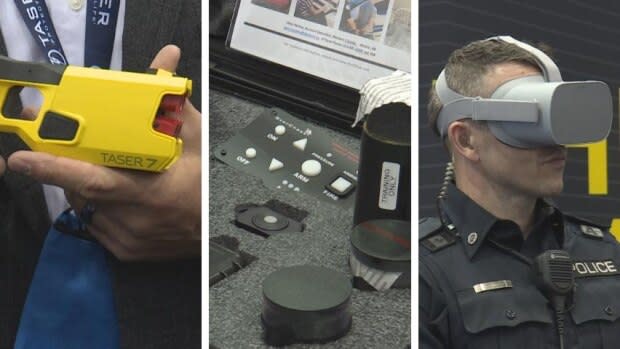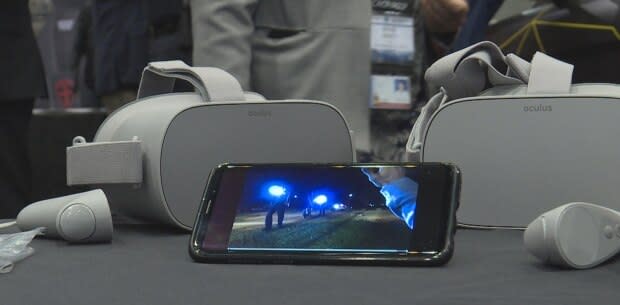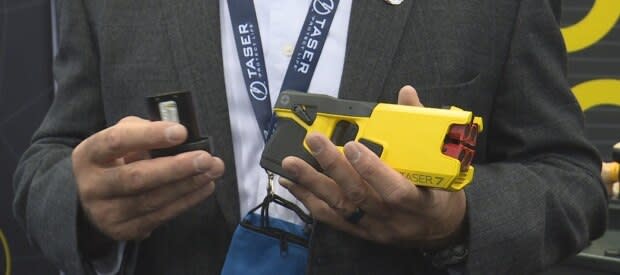3 gadgets that could make police officers more empathetic — and accountable
Hundreds of police chiefs and officers from across Canada are meeting in Calgary this week, as are dozens of vendors displaying the latest high-tech wares in the hope of attracting law enforcement buyers.
Some of the gadgets on display at the Canadian Association of Chiefs of Police Conference could make policing better, vendors say, not just for officers but for citizens — by making those who wear the badge more empathetic and accountable.
But, one privacy expert says as with any new technology, it's important to be wary of how the tools can be used.
Here's a look at three tools that could change policing in future — and why they might merit further scrutiny.
VR for teaching empathy
A new virtual reality system aims to train officers to develop empathy for those with mental health issues while they're in a calm environment, instead of a heated situation on the front-lines.
"With the VR capabilities, you're able to put someone in the shoes of somebody having that distress," said Vishal Dhir, the managing director for Axon. "So we wanted to create an avenue for officers to experience that and also to develop their empathy."

The VR scenario allows officers to put themselves in the shoes of someone responding to a scene, or a person with schizophrenia or autism who is experiencing a mental health crisis.
The company says it worked with both policing and mental health experts to ensure the portrayal was accurate.
A Taser that hopefully doesn't need to be fired
The VR system is part of training for a new Taser, also developed by Axon.
The Taser 7 has some new features that make it more likely to connect with a target if it is fired — but with a disincentive that hopefully means it won't need to be.
The stun gun has a louder, more intimidating-sounding arc of energy that the device can make before the user pulls the trigger, which the company hopes will dissuade someone facing down the less-lethal weapon so it won't need to be used.

But, if the officer does need to use the Taser, it includes software so all the firing data is automatically downloaded after the incident while the Taser's batteries are recharging — ensuring greater transparency.
Axon also sells body-worn cameras, and the company says forces could increase accountability by using its multiple devices as a network.
GPS for avoiding high-speed chases
Many of the tools on display are touted as solutions for avoiding dangerous situations like high-speed chases.
John Hartley, an account executive for Davtech, says Star Chase is a device that will do exactly that.
The device launches a GPS puck from the grill of a patrol vehicle, covered in a sticky substance and a magnet, so it will stick to the vehicle it hits.

"Now, the patrol vehicle can drop off. To the driver of the suspect vehicle, they just think the pursuit's broken off, but now you're following them at dispatch. So, when it's safe to move in and pursue them, you can then go in and apprehend them," Hartley said.
"The purpose of the product is to avoid or eliminate high-speed chases, the dangers to the officers, the dangers to the public, property damage, insurance costs, all those kinds of things that come along with it."
Reason to be wary, says privacy expert
Sharon Polsky, president of the Privacy and Access Council of Canada, says it's worth some follow-up questions for police forces — and the corporations behind the new technology — how the data from GPS devices or Tasers will be used and stored, especially by non-Canadian entities.
"From an access perspective, the police themselves might want to be concerned. Once it goes to the U.S., it's not unlikely that it's shared with American authorities, but it's also out of reach of police here," Polsky said.
"There's a handful of major technology companies that are getting into this business saying well it's going to be important to be able to prevent crime. Cameras don't prevent anything. They give evidence, maybe."


